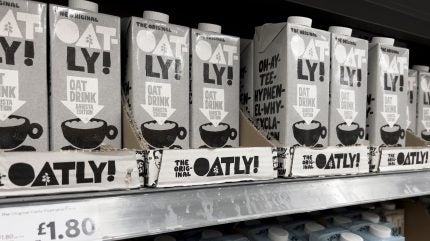
Oatly CEO Jean-Christophe Flatin has claimed the alt-dairy business is making progress as the company reported narrowing first-quarter losses.
The Sweden-based business, which made a loss of more than $400m in 2023 despite rising revenues, yesterday (30 April) booked another quarterly loss in the opening three months of 2024 but reported year-on-year improvement.
Oatly ran up a net loss of $45.8m in the three months to the end of March, compared to a loss of $75.6m a year earlier. It booked an operating loss of $28.4m, versus $71.6m in the first quarter of 2023.
Revenue inched up 1.8% to $199.2m and by 1.2% at a constant-currency rate. Volume was up 3.1%. Oatly cited “solid growth” from its North America business and its Europe & International division.
The company stuck to its financial forecasts for 2024. Oatly estimates its annual revenue will rise 5-10% when measured on a constant-currency basis. It is also forecasting an adjusted EBITDA loss of $35-60m. In 2023, Oatly booked an adjusted EBITDA loss of $157.6m.
Speaking to analysts after the group reported its first-quarter numbers, Flatin said: “We had a solid first quarter, and the year is off to a good start.”
The former Mars executive, named CEO last year, pointed to the improvement in Oatly’s gross margins.
“We are clearly seeing the benefits from the bold actions we have taken over the past two years. These benefits are most clear in our gross margin expanding nearly 1,000 basis points year-over-year, as well as our reduced SG&A, which was partially aided by certain fees and selling expenses that will hit a bit later than we planned,” he said.
Nevertheless, Flatin explained why Oatly had retained its outlook for 2024. “While we are encouraged by our first-quarter results, we recognise that we are only one quarter through the year and that our three operating segments are in very different stages of their turnaround journeys, their maturity, their execution and the amount of traction they have achieved on the strategic actions,” he said.
“Decades of business experience tells us that one quarter does not make the year. We are satisfied with our first quarter but we recognise we have three quarters in front of us to deliver to make a year.”
Oatly’s Europe & International division generated first-quarter revenue of $110.4m, a rise of 9.9%, or 7.7% when removing the impact of exchange rates. In North America, revenue increased 4.6% to just under $67m.
However, in Greater China, Oatly’s third geographic division, revenue dropped 30% to $21.8m. The company has said it is at an earlier stage of its efforts to boost its performance in Greater China compared to its other two divisions. COO Daniel Ordonez said the company had been moving to focus on “higher-margin products and channels while reducing costs”.
“The segment has reported just a $3m adjusted EBITDA loss in the first quarter. That is an impressive number when you also take into consideration the impact of the Chinese New Year holiday, where we don’t ship product for several days,” Ordonez said.
In Europe, which Oatly classified as eight specific markets, the company said its “retail takeaway sales” were up 5% in the first quarter, compared to a 3% rise in sales of “oat drinks” more broadly. On the same metric, sales in the wider plant-based milk category were flat, Oatly said. The markets the company analysed were Germany, the UK, Sweden, the Netherlands, Denmark, Norway, Austria and Switzerland.
In North America, meanwhile, Oatly said its sales “retail takeaway sales” were up 9.7%, with the oat segment growing 1.5% but the wider plant-based category seeing sales fall 3.5%.
Oatly’s management was asked on the call if it had any concerns about the wider category.
Ordonez pointed to Oatly’s gains in the category and sought to underline how the data at hand was only part of the overall plant-based milk market.
“Let us not take scan data at sales value to judge how the category is developing. Scan data is not fully representative of the total category growth,” he said.
“There is a growing bifurcation between plant-based drinks, the oat milk category and the Oatly brand. Oat milk continues to outgrow plant-based in general and Oatly outgrow both categories consistently.”
He added: “For all the non-measured channels in foodservice, [where] we have been working consistently for quarters now, you will remember, both Europe growing above 20% and the US growing about 35%
“What we’re doing at the moment, instead of figuring out what to do according to scan data, we’re head down, controlling the controllables, just like we said we would quarters ago: gaining distribution, driving strong velocities, introducing great new products for new occasions and investing more and consistently behind the brand.”
Shares in Oatly closed yesterday’s trading up 15% at $1.15. During 2023, the company’s share price fell more than 48%. When Oatly listed on the Nasdaq in 2021, its shares started trading at over $22.



